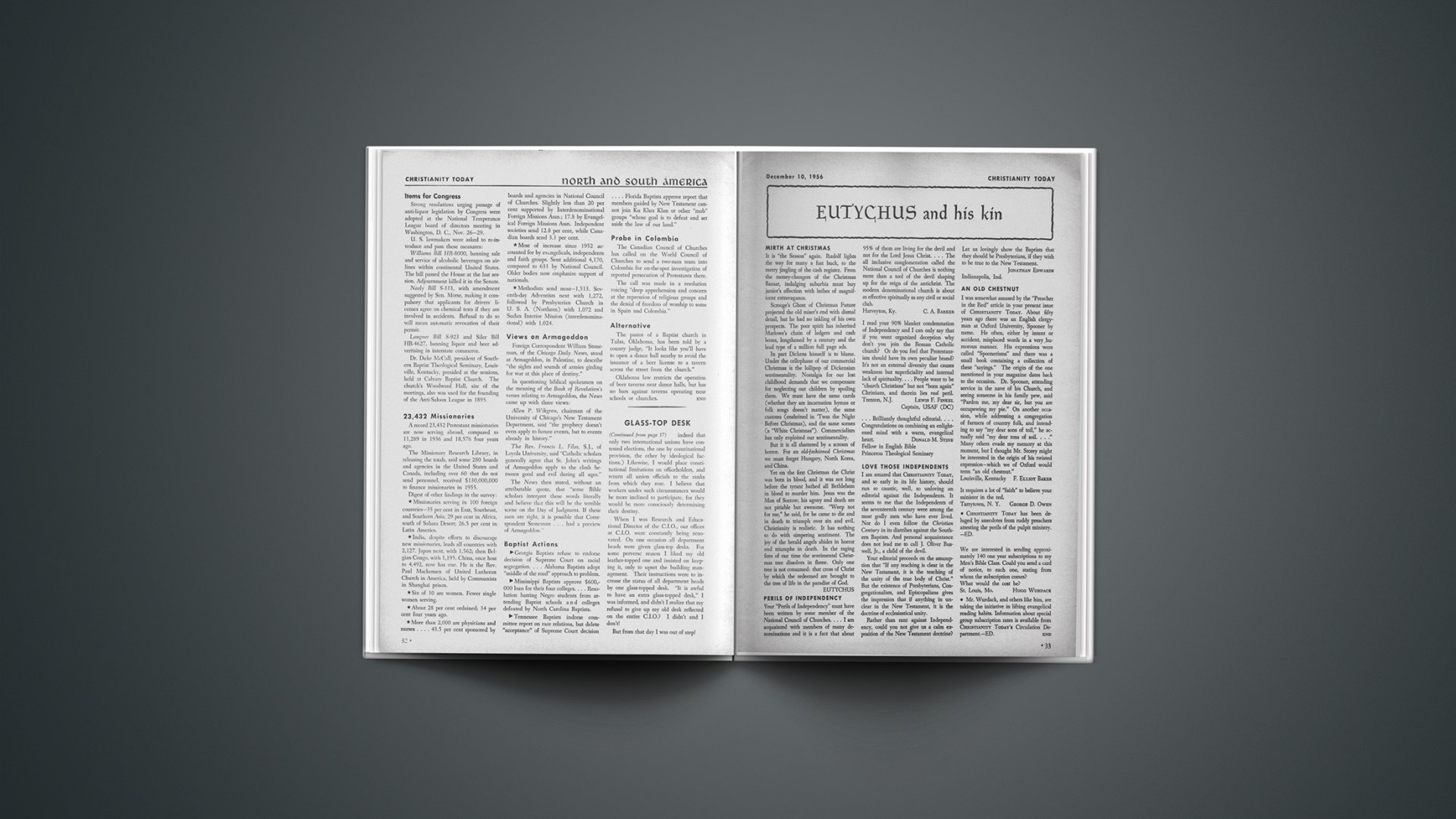MIRTH AT CHRISTMAS
It is “the Season” again. Rudolf lights the way for many a fast buck, to the merry jingling of the cash register. From the money-changers of the Christmas Bazaar, indulging suburbia must buy junior’s affection with bribes of magnificent extravagance.
Scrooge’s Ghost of Christmas Future projected the old miser’s end with dismal detail, but he had no inkling of his own prospects. The poor spirit has inherited Marlowe’s chain of ledgers and cash boxes, lengthened by a century and the lead type of a million full page ads.
In part Dickens himself is to blame. Under the cellophane of our commercial Christmas is the lollipop of Dickensian sentimentality. Nostalgia for our lost childhood demands that we compensate for neglecting our children by spoiling them. We must have the same carols (whether they are incarnation hymns or folk songs doesn’t matter), the same customs (enshrined in ’Twas the Night Before Christmas), and the same scenes (a “White Christmas”). Commercialism has only exploited our sentimentality.
But it is all shattered by a scream of horror. For an old-fashioned Christmas we must forget Hungary, North Korea, and China.
Yet on the first Christmas the Christ was born in blood, and it was not long before the tyrant bathed all Bethlehem in blood to murder him. Jesus was the Man of Sorrow; his agony and death are not pitiable but awesome. “Weep not for me,” he said, for he came to die and in death to triumph over sin and evil. Christianity is realistic. It has nothing to do with simpering sentiment. The joy of the herald angels abides in horror and triumphs in death. In the raging fires of our time the sentimental Christmas tree dissolves in flame. Only one tree is not consumed: that cross of Christ by which the redeemed are brought to the tree of life in the paradise of God.
EUTYCHUS
PERILS OF INDEPENDENCY
Your “Perils of Independency” must have been written by some member of the National Council of Churches.… I am acquainted with members of many denominations and it is a fact that about 95% of them are living for the devil and not for the Lord Jesus Christ.… The all inclusive conglomeration called the National Council of Churches is nothing more than a tool of the devil shaping up for the reign of the antichrist. The modern denominational church is about as effective spiritually as any civil or social club.
C. A. BARKER
Harveyton, Ky.
I read your 90% blanket condemnation of Independency and I can only say that if you want organized deception why don’t you join the Roman Catholic church? Or do you feel that Protestantism should have its own peculiar brand? It’s not an external diversity that causes weakness but superficiality and internal lack of spirituality.… People want to be “church Christians” but not “born again” Christians, and therein lies real peril.
LEWIS F. FINKEL
Captain, USAF (DC)
Trenton, N.J.
… Brilliantly thoughtful editorial.… Congratulations on combining an enlightened mind with a warm, evangelical heart.
DONALD M. STINE
Fellow in English Bible
Princeton Theological Seminary
LOVE THOSE INDEPENDENTS
I am amazed that CHRISTIANITY TODAY, and so early in its life history, should run so caustic, well, so unloving an editorial against the Independents. It seems to me that the Independents of the seventeenth century were among the most godly men who have ever lived. Nor do I even follow the Christian Century in its diatribes against the Southern Baptists. And personal acquaintance does not lead me to call J. Oliver Buswell, Jr., a child of the devil.
Your editorial proceeds on the assumption that “If any teaching is clear in the New Testament, it is the teaching of the unity of the true body of Christ.” But the existence of Presbyterians, Congregationalists, and Episcopalians gives the impression that if anything in unclear in the New Testament, it is the doctrine of ecclesiastical unity.
Rather than rant against Independency, could you not give us a calm exposition of the New Testament doctrine? Let us lovingly show the Baptists that they should be Presbyterians, if they wish to be true to the New Testament.
JONATHAN EDWARDS
Indianapolis, Ind.
AN OLD CHESTNUT
I was somewhat amused by the “Preacher in the Red” article in your present issue of CHRISTIANITY TODAY. About fifty years ago there was an English clergyman at Oxford University, Spooner by name. He often, either by intent or accident, misplaced words in a very humorous manner. His expressions were called “Spoonerisms” and there was a small book containing a collection of these “sayings.” The origin of the one mentioned in your magazine dates back to the occasion. Dr. Spooner, attending service in the nave of his Church, and seeing someone in his family pew, said “Pardon me, my dear sir, but you are occupewing my pie.” On another occasion, while addressing a congregation of farmers of country folk, and intending to say “my dear sons of toil,” he actually said “my dear tons of soil.…” Many others evade my memory at this moment, but I thought Mr. Storey might be interested in the origin of his twisted expression—which we of Oxford would term “an old chestnut.”
F. ELLIOT BAKER
Louisville, Kentucky
It requires a lot of “faith” to believe your minister in the red.
GEORGE D. OWEN
Tarrytown, N. Y.
• CHRISTIANITY TODAY has been deluged by anecdotes from ruddy preachers attesting the perils of the pulpit ministry.—ED.
We are interested in sending approximately 140 one year subscriptions to my Men’s Bible Class. Could you send a card of notice, to each one, stating from whom the subscription comes?
What would the cost be?
HUGO WURDACK
St. Louis, Mo.
• Mr. Wurdack, and others like him, are taking the initiative in lifting evangelical reading habits. Information about special group subscription rates is available from CHRISTIANITY TODAY’S Circulation Department.—ED.
END










